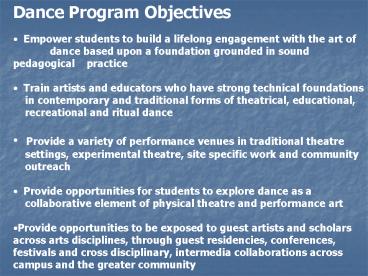Dance Program Objectives - PowerPoint PPT Presentation
1 / 5
Title:
Dance Program Objectives
Description:
collaborative element of physical theatre and performance art ... to guest artists and scholars across arts disciplines, through guest residencies, ... – PowerPoint PPT presentation
Number of Views:83
Avg rating:3.0/5.0
Title: Dance Program Objectives
1
- Dance Program Objectives
- Empower students to build a lifelong engagement
with the art of - dance based upon a foundation grounded in sound
pedagogical practice - Train artists and educators who have strong
technical foundations - in contemporary and traditional forms of
theatrical, educational, - recreational and ritual dance
- Provide a variety of performance venues in
traditional theatre - settings, experimental theatre, site specific
work and community - outreach
- Provide opportunities for students to explore
dance as a - collaborative element of physical theatre and
performance art - Provide opportunities to be exposed to guest
artists and scholars across arts disciplines,
through guest residencies, conferences, festivals
and cross disciplinary, intermedia collaborations
across campus and the greater community
2
- Dance Program Objectives (Continued)
- Through participation in Theatre and Dance
curricular and co-curricular offerings, students
will - Demonstrate proficiency in the elements of
movement to analyze, describe and creatively
manipulate movement and develop competency in the
craft of improvisation and choreography - Demonstrate an understanding of dance as a
cultural, sociological, historical, and aesthetic
phenomena, discipline and expression - Demonstrate critical reading and writing skills
that examine the performing arts as reflective
and reflexive of culture - Make connections with self and healthy living by
developing a working knowledge of basic anatomy,
kinesiology, somatic practices, injury prevention
and nutrition - Demonstrate a basic understanding of rhythmic
analysis and a heightened awareness of musical
form
3
- Dance Program Objectives (Continued)
- Through participation in Theatre and Dance
curricular and co-curricular offerings, students
will - Demonstrate the skill of performance and the
craft of choreography through participation in
faculty and student productions - Demonstrate a fundamental knowledge in technical
theater e.g. stagecraft, lighting, sound design,
costume and makeup - Demonstrate a working knowledge of the art and
science of teaching dance - Use technology to preserve and/or broaden the
making of dance art - Acquire a background in the business of the art
such as company management, production, grant
writing, and entrepreneurial pursuits.
4
Careers in Dance A career in dance requires
extraordinary discipline, tenacity, dedication
and excellent training. Training in Dance from
ISU may lead to professional careers in dance and
theater performance and choreography. It may also
serve as a basis for graduate study or open up
possibilities to job opportunities in fields such
as costume and makeup design, light design, set
and stage design, sound design, dance history,
dance medicine and science, dance and physical
therapy, somatic practices, dance ethnology,
dance arts writing, research and criticism, dance
photography and videography. At ISU, we offer
coursework in teaching dance in K-12 settings and
as well as provide sound pedagogical and
entrepreneurial training for those planning to
open their own dance studio. Related fields,
such as arts administration, arts therapies,
production and company management and music also
offer positions for the individual trained in
dance.
5
Performance Opportunities Curricular and
Co-Curricular Throughout the year, the
Department of Theatre and Dance regularly
produces six productions including the faculty
and guest artist dance concert, Idaho Moving
Project (IMove). In addition, student groups such
as Danson, produce two or more productions a
year. Auditions for IMove are held annually in
the Fall and are open to students, faculty, and
community members. Auditions for Danson occur at
the beginning of each semester to choose students
for their own pieces and for the company. There
are additional performance opportunities
available to students of Theatre and Dance within
our coursework such as DANC 210/410 Dance
Composition I/II, all DANC dance technique and
DAAC dance activity courses, THEA 300 Theatre
Movement Workshop, THEA 131 Voice and Diction,
THEA 251/252 Beginning/Intermediate Acting,THEA
390 Practicum in Theatre Arts, THEA g404 Problems
in Acting and THEA g424 Acting Styles.































